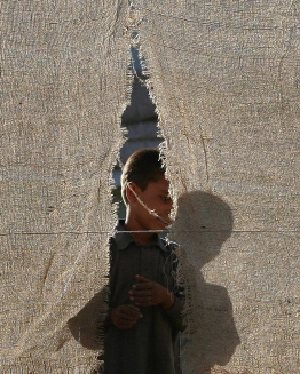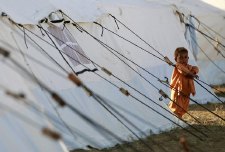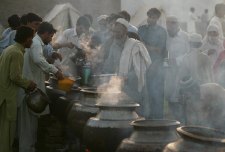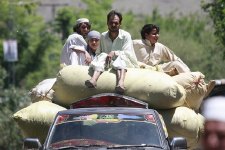Mosharraf Zaidi
 At the end of January this year, the international community’s key humanitarian agencies had done some basic number crunching for how they would deal with the Internally Displaced Persons (IDPs) crisis that was brewing in Pakistan towards the end of 2008. They estimated that the armed conflict in Bajaur and Mohmand agencies would likely drive the numbers of these Pakistanis who are refugees in their own country to about 600,000. To cater to those folks, it was estimated that roughly $36 million would be required to provide for the shelter, water and sanitation, food, and basic health care and schooling needs of the IDPs.
At the end of January this year, the international community’s key humanitarian agencies had done some basic number crunching for how they would deal with the Internally Displaced Persons (IDPs) crisis that was brewing in Pakistan towards the end of 2008. They estimated that the armed conflict in Bajaur and Mohmand agencies would likely drive the numbers of these Pakistanis who are refugees in their own country to about 600,000. To cater to those folks, it was estimated that roughly $36 million would be required to provide for the shelter, water and sanitation, food, and basic health care and schooling needs of the IDPs.
As I write these words, and the long overdue military operation to eliminate terrorists from Swat, Buner and Dir scorches more and more of the earth, that original estimate of 600,000 is exploding into ever larger numbers. Some civil society groups feel that the Swat-Buner-Dir IDPs alone will account for over a million people. The multilaterals and international agencies are slightly more conservative, with off-the-record numbers being cited in the range of 750,000 to 850,000.
Adding the new wave of Pakistanis who’ve been made refugees in their own country to the ones already displaced from Bajaur, Mohmand, Orakzai and other FATA agencies (around 560,000) places the total number of IDPs for 2009 at roughly 1.3 million.
It is very tempting, too tempting in fact, to begin to surgically deconstruct how we’ve got here. And perhaps some issues really do bear repetition. Pakistan is in this mess because this is a state that does not deal with small problems until they become big problems. It then tries to blast those big problems out of existence with heavy artillery. When it realizes it doesn’t have the legitimacy, the will or the actual firepower to do so, it cuts deals to make the problems go away. It then realizes that cutting deals with the devil makes the devil stronger, not the state. And with renewed strength the devil further undercuts whatever sliver of authority and legitimacy the state has.
That is the position the Pakistani state was in when President Asif Ali Zardari flew to Washington DC last week to give a final grand push to what has become the international relations equivalent of the Super Bowl of international begging. With ambassador Husain Haqqani leading the charge as quarterback, Pakistan has tried everything, including equating itself to the sinister and deeply unpopular AIG, to get more US money, so that it can fight and win the war against the terrorists. It seems the final Hail Mary, the myth of a Taliban takeover as being “60 miles from Islamabad†has worked.
Of course, the world is now so scared of Pakistan’s dysfunction, even Indian hawks are happy to sign checks for the Pakistani state. But where all the money will go is the world’s biggest mystery. It won’t go to the military, by design. But if things continue the way they are, and donors sign money over to the Pakistani treasury, it sure won’t go anywhere useful either. The Pakistani state can barely spend what it already has on the things that matter. Proof is in the across-the-board under-spent budgets in education, health, water and sanitation. The most recent example of the state’s indifference, ineptitude and incompetence is in the environmental arena.
The Rawalpindi Environment Improvement Plan (RIEP) has apparently been shut down by the Asian Development Bank, because the money Pakistan keeps borrowing to fund the project, never seems to produce the outputs they’ve agreed on. But the real punchline is that all this is taking place in Punjab, the most efficiently run province in this weakened federation. The reason for constant delays? The project has had four changes at the top owing to constant charges of corruption.
Given this kind of a context, opponents of the military’s scorched earth tactics need to consider the alternatives. What would critics of this latest and much more assertive offensive into Swat, Buner and Dir have the army do? Follow ambassador Haqqani’s brilliant new juxtaposition of Pakistan with Iraq, and pump Punjabi boys by the dozens into Pakhtun homes — Fallujah-style? Or perhaps sign another peace deal? The previous half a dozen having worked so well.
Alternatively, of course, those who have been advocating decisive and lethal military action need to dial it down a little bit. The necessity of military action does not mean that its execution is a cause for celebration. As of May 9, over 110,000 people from Swat, Dir and Buner had registered as IDPs in Swabi, Mardan and Charsadda. Those that have so rightly been calling for decisive leadership and military action must now go beyond Facebook and Twitter. The IDP crisis is the biggest test of Pakistan’s humanity since the October 2005 earthquake. This country’s besieged citizens and its civil society have come through for each other before. They must do so once again.
Pakistanis need to take a time out from being for or against a raft of abstract ideas and histories about Jinnah’s speeches, Iqbal’s social habits, Zionist conspiracies and the Cookie Monster’s evil eye. In times of war, moral clarity is a luxury, and not one that any camp in Pakistan has any kind of monopoly over. Circumstances in the near to medium term will likely continue to allow for moral clarity only among those with little regard for nuance or delicacy. Pakistanis don’t have to stop having an opinion on issues, but they must certainly stop being paralysed by those opinions.
The actions now on the top of the Pakistani priority list require much less discussion and debate than what Pakistanis are used to. Of course, police reform, decentralisation, the restoration of the 1973 constitution, neutralising the president’s office and the reinvigoration of the prime minister’s office are primary tasks needed to rebuild the broken institutions in the country. But the IDPs influx out of Swat, Buner and Dir, requires us to get moving, and get moving fast.
IDPs, both those in the camps and those that are out of camps, all need some basic things. Tents, bedsheets, mattresses, pillows, toothbrushes, soaps, and combs. They need single-source support, meaning that Pakistanis wanting to help must go through the so-so channels that already exist, rather than the perfect channels that exist only in our imaginations.
Those Pakistanis that do get involved will discover dozens of NGOs, both of the auntie and uncle variety, and the mullah variety, ready to absorb money, in-kind donations and the time and effort of volunteers. Those that invest in going to the IDP camps, as near the urban centres as the ones in Islamabad, and Rawalpindi, and as far as the ones at Jalozai, will discover that the humanity of people knows few bounds.
Depressingly, what everyone will discover is that very little of the response to this crisis is being led from the front by the government. This is not because the government doesn’t care. It cares deeply. It has to. Those folks that are being displaced are not just people, they are voters too.
But caring for people, and knowing how to take care of them are two separate things. Sixty years of getting it wrong in Islamabad, Peshawar, Lahore, Quetta and Karachi means that the basic instruments needed to coordinate a response to the crisis don’t lie in government. They lie in the innovation, ingenuity and emotional investment of NGOs, international agencies and most of all, ordinary Pakistanis. We must celebrate the fact that Pakistan has banked on these entities before, and ensure that they are out in full force once again. The response to the earthquake must not be a one-off demonstration of humanity. It must prove to be the rule in Pakistan.
But in mobilising to respond to the IDP crisis, and in generating an appropriate respond, Pakistanis must remember how we have got here. The only thing that is a guarantee against the terrible tragedies that have haunted this country for the last several years is an effective state. For that, there is no NGO large enough, nor international agency competent enough. In the long run, only Pakistan can help Pakistan.
Mosharraf Zaidi wrote this originally for The News. Mosharraf has recently set up a special website to consolidate information and data on the IDPs situation in Pakistan.























































I don’t know if its just me but I did not really get the article. My intent is not to critcize the writer. That’s the easy part. My intent is to make an effort to clarify some of the thoughts that were discussed in the above article.
Actually at times, if you read most comments as well, no matter how you write an article, no matter what the focus of that piece is, the commentators all consider themselves well qualified to suggest a perfect solution.
Its the same thing over and over again, its the chaos of comments and solutions that keep pouring in, on from one article to other. Are we losing the art of analyzing and staying focused.
When military was not doing anything, we were all booing the government for not taking any action. When they are doing something, we are talking about some other problems. Are we too near sighted or just a plain old complusive winers.
I don’t want to suggest big solutions as I am not neither educated to handle government affairs nor experienced in such matters. The problems that we are facing today are merely symptoms of a terminal disease that we have suffered since existence of our country. The army & the government both took over british style of ruling since 1947 and the people never in reality became free. Free to think and free to act. We were kept uneducated, we were kept away from opportunities and we were consistently in an organized well planned consipracy manner made to believe that we are somewhat lesser humans beings and we need a lathi or danda. We were made to believe that we were guilty until proven otherwise. We the awam were betrayed over and over again. And no tactics were held back. We were manipulated in every possible way. In the name of Islam is the top one. Nationalism is second.
We are asked for opinions in such matters that we havenot been educated or qualified for. We lack structure among awam and government affairs. And clearly our enemies, NO, not america or talibans or india. Yes my friends, our leaders, our elite class, our so called educated elite landlord, land cruiser cruising mofu class that are our worst enemies. They have blood of so many and they are the ones who have voluntarily kept our masses down under their foot. JUST LIKE IN BRITISH RULE.
Even though when you walk around streets of pakistan, you see many people displaying with no contempt or shame acts of illiteracy, whether its throwing trash on the street, crossing a read line, giving finger to a cop or beating someone in front of a whole crowd. The people of pakistan still always make me proud. The housewives and mothers who continue to feed a beggar or a poor afghan child out of coutesy. The bicycle riding simple man who would help when needed. Somewhere in the lower middle class where there may be some class left. Integrity and honor, fear of Allah and love for other human beings. The massively suffering class that never really had the opportunity to take bribe or corrupt themselves. They are also the people who volunteer in so many things at their town level.
Coming back to the article above. These events are very much out of our control. Talibans or zardari, both are equally disgusting. The government structure is best desribed as no structure. Our Muwashra is sick. but some of our souls are intact. Lets learn to observe, lets learn to be patient so we can make the right decision at the right time. Lets help those refugees in the name of Humanity but lets also teach our children to be open minded and free in their thinking. Lets keep our integrity, one house one family one town at a time. I am sure we can change things.
There we are… I haven’t read the TIME article yet, but the title seems to say it all… if the government, army and all of us do not fill the void, these so-called charities will… the JI has not one but several, and PTI is already in the camps… this is a tried and tested tactic of theirs, and of other groups of their ilk in the Middle East…
Physically being there to thwart their nefarious aims under the guise of helping refugees is not possible, but I would urge everyone to look into any charity they are about to donate to, and make sure it does not have any links to these far-right groups…
There are plenty of charities with pristine records whom one can donate to instead of these JI and terrorist fronts…
Time has a good piece on challenges facing us today
http://www.time.com/time/world/article/0,8599,1898 127,00.html
Terror-Linked Charity Finds New Life Amid Pakistan Refugee Crisis
Sepoy at Chapati Mystery has links to a number of charities:
http://www.chapatimystery.com/archives/homistan/he lp_the_idps_in_pakistan.html
Please stay away from the charities that are fronts for the Jamaat-e-Islami and other such groups… UNHCR and Edhi are of course trustworthy…
Before the point of this article gets lost we as Pakistani’s all over the world should donate to help IDP’s at our nearest and reputable charity -one that we feel comfortable with. For those in the United States, I would advise to visit http://www.hidaya.org to see their track record before donating for this current crisis. Hidaya has done reasonable charity work in the past in Pakistan. If there is another charity working to help the IDP’s that you know about, please share it’s information with the fans of Pakistaniat so we can help our brothers and sisters back home asap. Thanks.